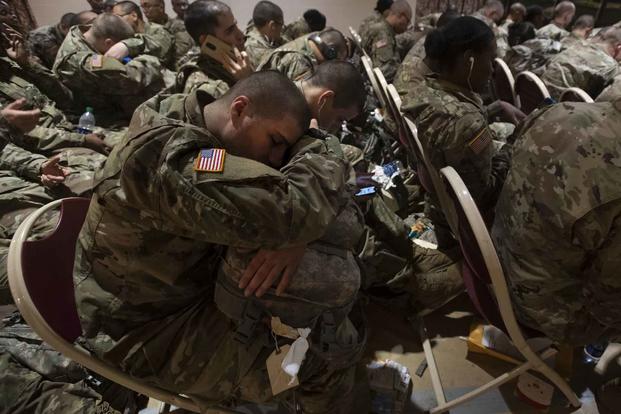Service members still aren't getting enough sleep, in large part because there's no coherent Pentagon effort to remedy the problem, according to a new report by the Government Accountability Office released this week.
The GAO found that fatigue among service members "appeared to be more the rule than the exception," with active-duty troops sleeping less than seven hours nightly twice as often as civilians. That lack of sleep has contributed to safety mishaps, near-misses and numerous deaths.
"There's recognition of this [problem] within the military," GAO report author and military readiness expert Diana Maurer told Military.com in a phone interview. "The problem is no one owns it."
Read Next: All US Commissaries Plan to Offer Home Delivery of Groceries Starting in Late Summer
Health experts recommend seven to nine hours of sleep for adults. It's not just quantity: Sleep quality is important too, making it hard for troops with uncomfortable mattresses or pilots dealing with noise and light to get meaningful shut-eye.
Pilots, missileers, aircraft maintainers and vehicle operators all noted in the report how fatigue has led to near-misses at work.
"Sometimes when I'm driving, I find myself falling asleep and I have to catch myself," one vehicle operator said in the report. "I could kill someone on accident because I'm not getting the right sleep."
Despite the military undertaking almost 130 fatigue-related research projects since 2017, most research findings are stovepiped, inhibiting information-sharing and sowing confusion over who within the Defense Department should oversee sleep and fatigue issues. Offices that manage training, readiness, safety and suicide prevention don't share information on fatigue-related events under their purviews either.
"There is universal recognition that it's an area of concern," Maurer said. "Everyone agrees that someone should do it, to take actions to address it, but it wasn't clear who that someone should be.
"So, if no one's in charge of addressing the problem and everyone else thinks someone else's taking care of it, you're not going to see major change," she said.
The report comes as the DoD has recently refused to say whether troops are getting adequate rest time at home between deployments, and as service members are spending more time away from home than ever.
Almost 500 deaths, serious injuries and property damage events were reported within the Department of the Navy between 2015 and 2019 -- all related to driving while fatigued, according to the GAO report.
"DoD recognizes that impairment from fatigue can be equivalent to the effects of alcohol intoxication and significantly increases the risk of physical injury," the report says.
In 2017, two disastrous Navy ship collisions led to the deaths of 17 sailors and hundreds of millions of dollars worth of damage. Fatigue was later identified as a contributing factor in both collisions.
It's not just safety that sleep affects. Chronic conditions such as obesity, depression and heart disease can all be spurred by sleeplessness.
The report also noted the links between lack of sleep and increased risk of death by suicide, a longtime struggle for the DoD. It's overlap like this that makes Dr. Vince Mysliwiec, a sleep researcher at University of Texas Health-San Antonio and former sleep medicine consultant to the Army's surgeon general, wish the DoD would create a stand-alone office to oversee better sleep and human performance practices.
"The implementation of these [best sleep] practices servicewide is what needs to happen," he told Military.com in a phone interview. "They've identified the problem too much."
Mysliwiec added that, while the study captured the need more a more focused effort, it didn't reference two other issues likely affecting some troops struggling with sleep -- alcohol and smartphones, both of which are notorious sleep disruptors.
But any actual implementation from new sleep efforts ultimately won't fall to the top brass, Mysliwiec said. It will be up to unit leaders.
"At the end of the day, when the mission is there, you have to recognize the ultimate responsibility for the military is to accomplish the mission," he said. "And then at times, sleep will be sacrificed. But it doesn't have to be sacrificed every day."
Related: Crew Shortages, Bad Mattresses Causing Navy Surface Sailors to Lose Shut-Eye, Watchdog Says














